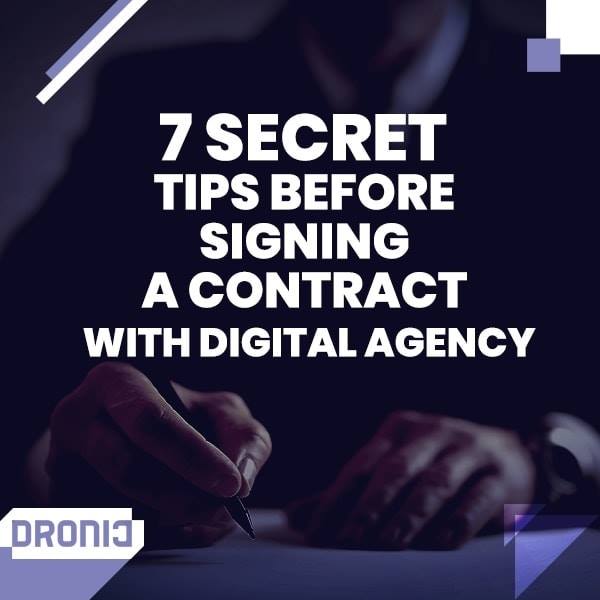Today we share with you 7 tips you should know before signing the contract with Digital Agency to avoid an early relationship ending.
Anytime you enter into a new relationship, you need to set rules and agreements to ensure a healthy relationship with your partner.
The same for the relationship with your Digital Agency, you need to know what should be included & NOT be included in your contract.
And that’s what we will discuss with you in this article.
Let’s Start.
1- Contract Length:
A contract with your digital agency is like a marriage license– that piece of paper should never be the only thing holding a relationship.
So the contract should not be for a long time as 12 months, for example.
What if your relationship with your agency has run its course and you no longer feel that it’s a good fit?
So you can sign for only 1 : 3 months in your first contract with any agency.
Good agencies recognize this, and they don’t hold their clients to long-term contracts.
2- Knowing the Scope of Work:
Everyone in your life has a role; you need to know what he/she comes to do in your life!
Also, you should receive from the agency a brief explanation of their services and work to make sure that you understand the type of services under each term and to what extent the company is going to offer those services.
For example, if you get a Social Media Management service, you need to know the number of posts that will be posted per week on which social media platform.
3- Performance Guarantee:
It is not professional to have “expectations” from the agency. Let’s agree and for relationships also… No matter.
This part provides the client with a clear idea about the exact process and service that they’ll be getting. For example, the agency can mention the number of posts it will create and post for you per week or month.
Performance is best judged by identifying the key metrics related to that account, such as engagement rate, website traffic, etc.
It would be beneficial for you if you read and checked these clauses well in the agreement.
4- Content Ownership:
Frankness is the most critical pillar in any relationship.
Everything should be clear about what you own and what the agency owns.
Make sure if your agency might allow you to use proprietary copy and images so long as you are a client of the agency.
And understand what belongs to you and what belongs to the agency.
5- Keep Your Data Safe:
All your private details with your partner in any relationship should be SECRET—the same for your data and information.
So you should add a confidentiality clause in your contract.
The agency would be restricted from using your data in a certain way in cases where the agency is handling your customer data or email lists.
6- Payment Terms:
You should be aware of the payment terms of the agency.
Most agencies work on upfront payment. If your brief is for a particular campaign, payment terms might vary, with a certain percentage being paid upfront and the balance on the campaign’s completion.
You should know every small detail starting from the date and day of pay per month, the mode of payment, the name to be mentioned on the cheque (if the method of payment is by cheque) to the amount mentioned properly in words and numbers.
The agency should also mention the additional charges or fees and the late payment fees.
7- End of the Contract:
In business relationships, there’s no place for “Endings are morals.”
The basis for termination should be discussed and noted down in the contract by both parties.
Termination can be based on various factors such as performance, force majeure, etc.
It is essential to discuss the termination process as sometimes due to not so precise process rules; both parties face a lot of problems.
You need to agree with the agency about if there would be any additional expenses or fees related to the termination of the contract and the notice period that must be given for termination.

